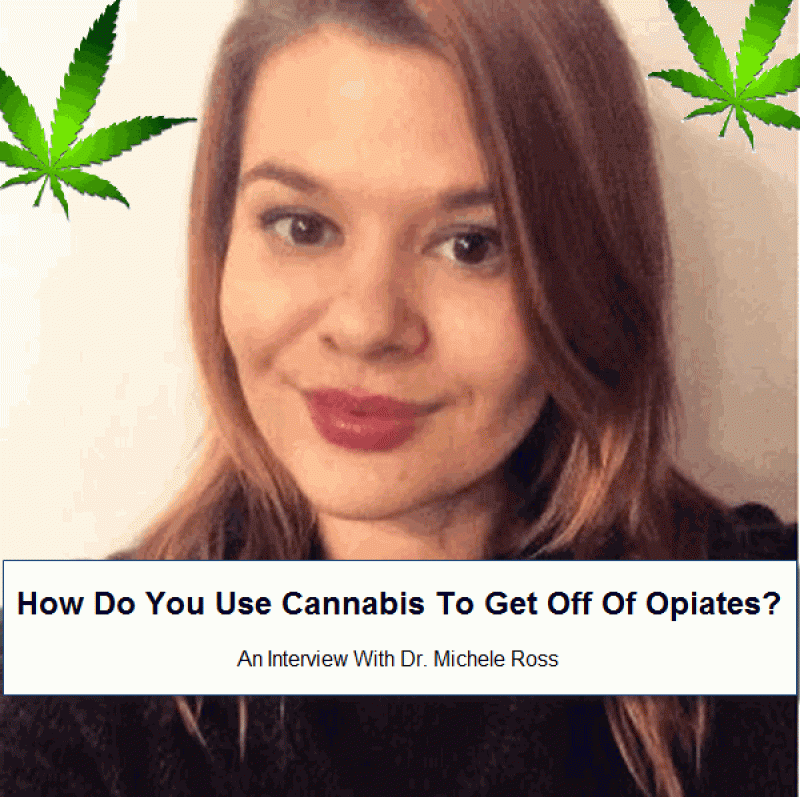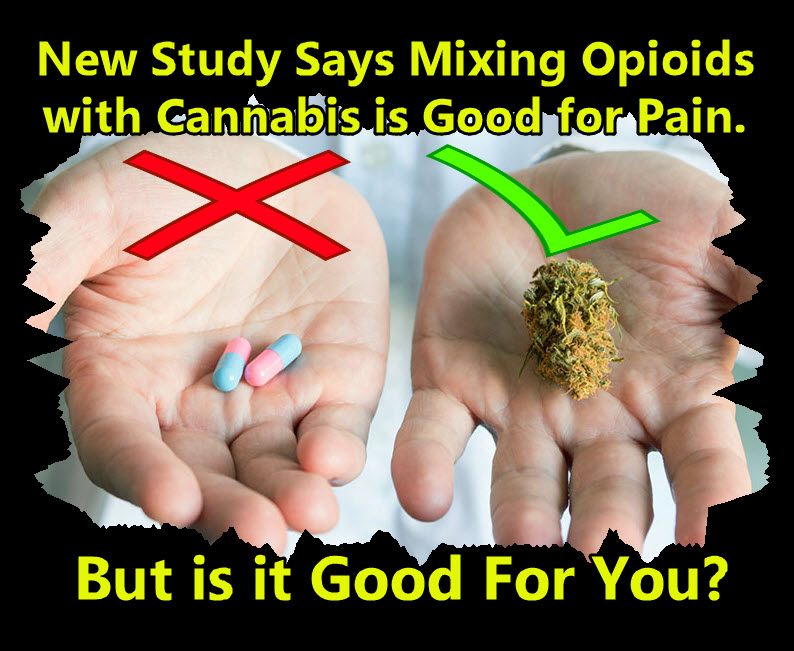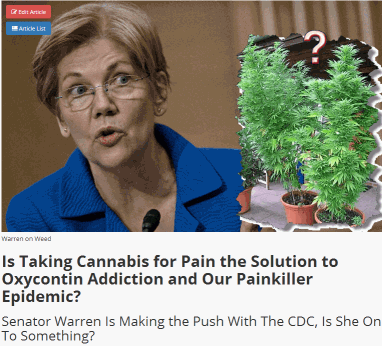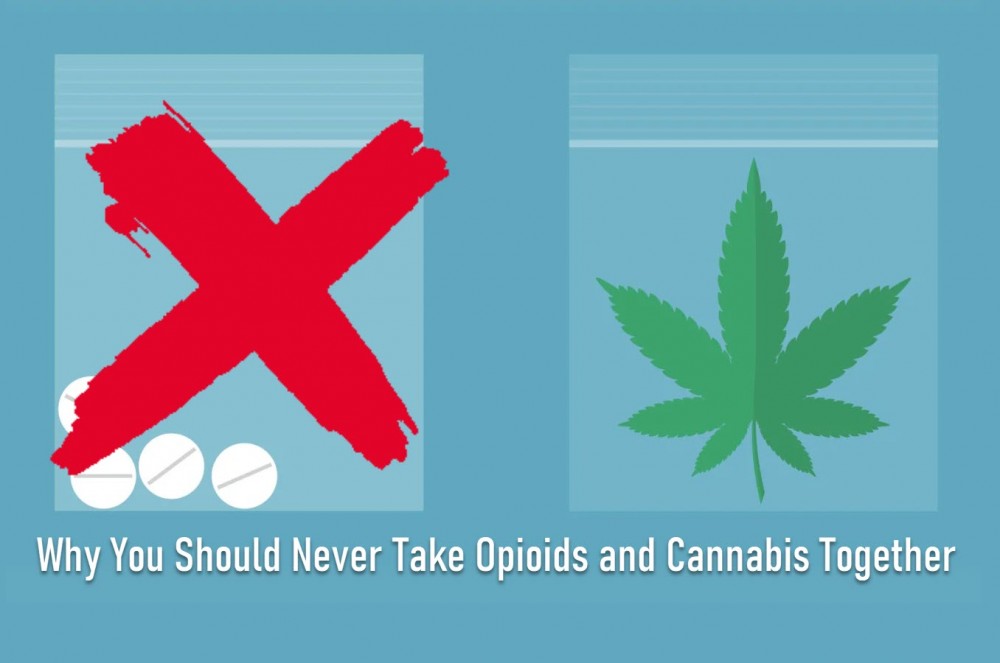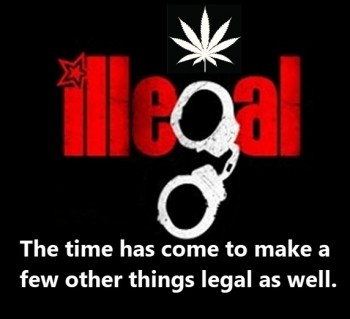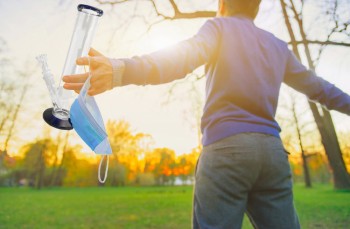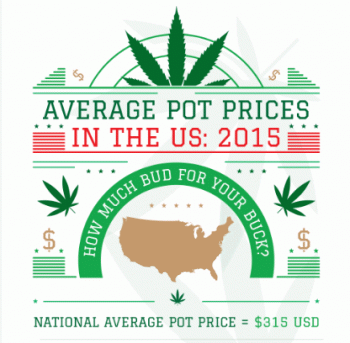To listen to our full length interview with Dr. Michele Ross, just click the YouTube video below.
00:06 Michelle Ross: Hello.
00:07 Curt Dalton: Dr. Michele Ross, how are you?
00:10 Michelle Ross : Wonderful.
00:13 CURT: You look your usual stunning today so we probably, you don't even have to keep the video on, so we probably won't record the video part but... That's okay. It's always a pleasure to see you.
[chuckle]
00:24 CURT: Well, there's big news out for the cannabis.net crowd and yourself, re-scheduling is rumored to be less than a month away, as we're at almost July 4th weekend. Being a neuroscientist, specializing in cannabis, cannabinoids and anything based in this industry, what does that mean to you? Is that good, bad or ugly, and why should we not or be excited about it?
00:48 MICHELLE: Be excited about cannabis? There's so many reasons to.
00:51 CURT: If we go from one to two, as a scientist, a neuroscientist, what will that allow the government to do? What will that allow you if you got private funding to do, and should I be excited for epilepsy, autism and cancer? Give us the scoop.
01:06 MICHELLE: Okay. Well, the policy concerning cannabis is one of the things that the general public and even the scientist within the cannabis industry don't really have a good grasp on, so moving cannabis from anything besides Schedule I sounds like a great idea. Right now, the government considers that cannabis is pretty much on the same level as heroin, that there's no medical benefits to it. But in fact, moving it down to just Schedule II actually creates a lot of problems. For example, it really just opens it up for complete regulation by the FDA as well as turning it into sort of a pharmaceutical. Schedule II doesn't legalize cannabis. Other drugs on Schedule II include cocaine, methamphetamine, so as you well now, you can't go to your pharmacy and buy cocaine. [chuckle] So, basically, moving cannabis down to Schedule II doesn't do anything for medical patients. In fact, it can actually really harm them being as, one of the things that could happen is that the cannabis that's being sold in dispensaries now or specific cannabis products could be subject to FDA scrutiny and they can go and say, "Okay, well you shouldn't have this being sold without going through the clinical trial process", which could be five to seven plus million for each of the different products that are out there.
02:37 MICHELLE: Another thing is that you might hear is that Schedule II is really a good thing for research. Oh, because at Schedule I it's really hard for researchers to do research on cannabis and if it's dropped to II it'll be amazing, we can do all these research, the government will fund it, etcetera, etcetera. That's also a fallacy. So, as we know it right now, there's no real funding for the medical benefits of cocaine. Keep coming back to that because that's something I'm familiar with as a drug addiction researcher. But right now, all the funding from the federal government goes towards the negative effects of cocaine on the brain and body. So what we'll see, even if it's dropped to Schedule II, is that cannabis will only be studied as harmful effects of cannabis on the brain and body. So no real big difference from what we see now.
03:30 MICHELLE: Another thing will be that it won't allow us to study the strains and products that are sold locally in each state. For example, I'm in Denver, Colorado. There's so many different products that people combine medically or recreationally, even if they're not from Colorado. You come into Denver, Colorado from another state, go pick up an ounce of cannabis and then consume it here or who knows what you do but everyone from the nation can basically have access to Colorado products. So why aren't we studying Colorado products? Well because they're Schedule I drug and so our universities won't let us study these locally grown products. The only source of cannabis scientists can study legally is that source that comes from the only DEA-approved source of research cannabis in this country which is the University of Mississippi.
04:26 MICHELLE: So when it's dropped to II, the government and the DEA may issue another license for another university to grow cannabis but we're still not gonna be able to go to a local dispensary, take a product, put it in the lab, see how it helps people with cancer, with epilepsy, with anything, it's not gonna be that easy. We'll still have to go make a call to our agencies and fill up the paperwork to get this really wonky University of Mississippi weed that doesn't represent anything that's in our current markets. So Schedule II for me, is a big no-no. It's a baby step but what we need for true cannabis policy reformat benefits patients, researchers and the cannabis industry, is really for cannabis to be taken off the Schedule completely, so de-schedule and not re-schedule.
05:19 CURT: What are the odds of that happening?
05:22 MICHELLE: Oh. [chuckle] Well, I think the only political candidate at this time to have even put anything in or even talk about de-scheduling completely was Bernie Sanders. And as a Senator, he actually put in a bill for taking cannabis completely off the Schedule. I think right now, the odds on that passing are pretty much less than 1% but almost anything cannabis-legalization-related really has a low chance of passing anyways. But his was definitely the most positive for cannabis legalization but, it just doesn't seem to have that support. And that's partly because our legislators don't understand policy. They don't understand what cannabis can do. They don't understand the parts of it. Many of them think that CBD is cannabis. So, when you legalize CBD or cannabidiol, they think that they've legalized medical marijuana, and that's not really the case. They just legalized one ingredient in cannabis. So, unfortunately, I don't see cannabis being de-scheduled in this year, next year, even the next five years. We would really have to have something amazing happen, and I just don't think that our country is at as progressive on cannabis reform as we'd like it to be.
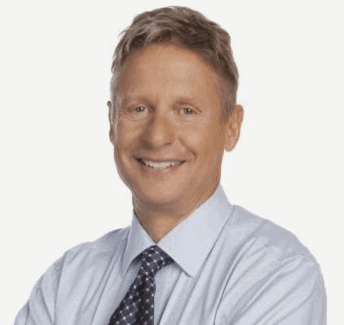
06:41 CURT: So, you're not thinking Gary Johnson has a shot in November, I see?
06:44 MICHELLE: Oh, my goodness. Well, I wish Gary Johnson had a shot, but we all know that Independents don't really do well in our country. I think the one that had the closest shot was Ross Perot, but I was a wee little girl back then. So...
[chuckle]
06:57 CURT: Gotcha. So, let me ask you, if I'm at the next neuro-science study Harvard expo and I'm sitting with yourself and you colleagues, what is the most exciting, let's say it's de-scheduled, you have full reign, full diving into whatever you wanna look at, what is everyone in your niche excited to look at? What is the most promising we can't wait to start testing what for what?
07:23 MICHELLE: Oh, my goodness. Well, this plant has so much potential. There's probably over 100 different conditions that it could treat. But I definitely think, though, the one that's most controversial yet has the most application is the potential to treat cancer. So, cannabis, right now there's a lot of aneMichelleotal evidence for cannabis treating cancer. But there hasn't been any clinical trials here in the United States, and most other countries. I know that other countries like Australia, I think, are just about to launch something with that. But, a lot of researchers would like to see that. One in two women will have cancer at some point in their life. I'm sorry, one in two men will have cancer, one in three women will have cancer. So, it's something that it impacts all of us. So, if we could do something to treat it that's not chemotherapy or radiation, that's the avenue we should be pursuing.
08:16 CURT: Gotcha. Okay. And as far as health plans and health insurance and structure for future work you do, what would you like to see health insurance say to scientists next year? Again, if we could make it off a Schedule II into some sort of rescheduling or some sort of alcohol-based ruling, what would health insurance companies, how could they help you or hurt you?
08:40 MICHELLE: Well, health insurance companies don't directly deal with the scientists. They deal with more the doctors' offices. But, one of the things that health insurances could do to help patients and healthcare professionals working in this industry is really not penalize them for recommending cannabis or working with healthcare professionals that are open towards it. As a medical patient myself, I've dealt with, I would say, doctors that were too scared to work with cannabis patients or health insurances that, for example, one is Kaiser. They're really not fond of cannabis use by it's members because there's no cannabis-recommending doctors that are part of the Kaiser network. So, I would just like to see that patients don't have to make a decision about their healthcare. Basically, it doesn't matter what drug you're on, whether you're on a Xanax or cannabis, you shouldn't face discrimination by your doctor or your health insurance plan.
09:41 MICHELLE: There's a lot of things that even when the laws change, we're still gonna have to see reform on the health insurance side, on the healthcare professional employer policy side. There's a lot of things that have to change. The war isn't gonna be over even though if Cannabis was de-scheduled tomorrow.
09:57 CURT: Sure, sure. Now, I know that a lot of the cannabis.net readers are familiar with recent articles we've done on different types of CBD oil. Charlotte's Web, Rick Simpson Oil, how it affects autism, epilepsy, even cancer cells. If you could make a statement to people about the oil, and the different variations, and the levels of THC and CBD, as a neuroscientist, what would you say to people who are looking for that cure or that elixir? Should we be believing in the oil and the things we read? Is it there yet or are there different versions? Just from the neuroscience side, is there progress being made?
10:40 MICHELLE: Okay. So, I do have to say that CBD is being studied in clinical trials now here in the United States and across the world. I think there's over 20 clinical trials right now. One of the biggest and well known groups that's studying it is called GW Pharmaceuticals. So, they're actually studying it in real clinical trials. So, there obviously is value to CBD. The biggest question for patients and consumers is "Is the oil that I'm picking up online or in the store the real thing?" or "Is it equivalent to what's being studied in the clinical trials?" or "Does it even have what it's saying it has?" So, as a consumer, you have to be weary about where your CBD oil or hemp oil or cannabis oil is coming from. There's definitely a bunch of different varieties, and in fact, there's even a naughty list.
11:32 MICHELLE: The government actually did a test of different products in 2015 and I think in 2014, and tested these products. "Okay, I got this hemp oil from the internet. I paid $200 on it and it doesn't even have an CBD whatsoever." And there was actually a listing of about 20 different companies one year that had no CBD in their hemp oils. They were actually just selling snake oil, or what we refer to nutraceuticals that contain zero parts of the ingredients that are there listed on the label and so that's really concerning.
12:05 CURT: Okay, so you're in a sense that people aren't even getting the product they think they're testing, they're getting as you said, snake oil, something that looks like it but... Neurologically speaking, can you explain a little bit the difference between THC and CBD on the body to our listeners and our readers?
12:22 MICHELLE: Great. There's a lot of misconception about how THC and CBD work. One of the biggest myths out there, and I'd like to clear that up right now. So we have several cannabinoid receptors in our body. These are sort of like the locks on our cells and so they need a key to activate them and turn on certain processes within our cells. So for cannabinoid receptors type one and two, THC is a key. So they'll bind to those receptors and then turn on different processes, whether they're turning on immune cells, relieving pain, things like that, but that's how that works.
13:02 MICHELLE: CBD, many people think that it actually works differently. THC only works on cannabinoid receptor type one and CBD only works on cannabinoid receptor type two. This is where it gets really messy for even people in the scientific field 'cause this was like a myth that was thrown around. So THC, again, works on both cannabinoid receptor one and two, so those are CB one and CB two receptors. CBD doesn't actually act like the key for any of those receptors, it acts on a different part of the receptor. So what it does, when you have THC in your system and then you're also taking something with CBD, what happens is the CBD combines to a different site outside that lock area and change how THC is activating that receptor.
13:58 MICHELLE: So basically, sort of weekly it activates THC. So whenever you take CBD it's lessening the effect of THC. CBD isn't directly activating any of the receptors. So CBD is actually sort of a dirty drug, it's sort of funny. So as we talk about it in pharmacological terms, CBD has many actions. So CBD can interfere with how THC and other endocannabinoids activate the CB one, CB two receptor. It can also inhibit certain enzymes that break down or other endocannabinoids, our natural marijuana that's produced in our body. Example, it actually inhibits an enzyme called "fa" and that actually is an enzyme that would gobble up an endomide, a major endocannabinoid produced in our body. So if you take CBD you can actually boost your own levels of endocannabinoids so that's a very different thing that CBD can do versus THC.
14:58 MICHELLE: Another interesting thing that CBD can do and I don't think most people know this, but it actually interacts with serotonin receptors. So serotonin is one of the neuro-transmitters that secrete a neuro-brain body and it regulates everything from feeding to sleeping to reproduction. So it's interesting because it can also lift your mood. And CBD is something that's super valuable for relieving anxiety and depression so THC and CBD will have very different endo-effects in the body even though they both act on the endocannabinoid system.
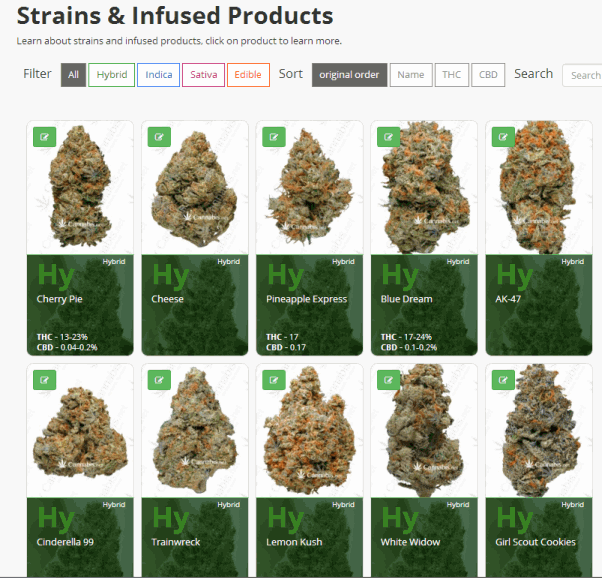
15:37 CURT: On a personal level, what type of strains do you like? It's Fourth of July weekend and Dr. Michele Ross is gonna unwind. Do you prefer a CBD, a THC? What are your favorite strains of marijuana?
15:49 MICHELLE: Yeah. So I actually have a chronic illness called fibromyalgia. So I'll take strains that will actually relieve my symptoms of that chronic illness. And then, there's also strains that I'll take for fun or for sleep or for this or that. One strain I've been really loving right now, it's called "key lime pie" which, funny enough, is actually my favorite dessert. So actually, I went to a dispensary, it was called "Verdy Natural" and they had a whole bunch of strains I hadn't seen before. There was lemon pie, cherry pie, key lime pie. I'm like, "Oh my God, which one do I choose? I'll take them all." So I've been loving the pie so far.
16:28 CURT: And what is your favorite delivery system right now as you obviously are very educated? Do you smoke, bake, edibles, what do you enjoy?
16:35 MICHELLE: Oh, goodness. Well, any way I can get cannabis in my system I enjoy it 'cause it definitely helps with my pain and other symptoms and then also just definitely helps with my mood and anxiety, so I love cannabis. So at night I'll definitely take an edible and actually one of the edibles I've been taking now, sort of an interesting one. So I've been eating THC-infused pumpkin seeds which is gluten free and super healthy. But that way, when I go to bed I'm on a diet right now so it's just so funny to try to go and say, "Okay, can you lose weight while eating cannabis?" Yes, you can. You just have to make sure you're not gobbling up brownies before you go to bed. [chuckle]
17:16 CURT: Oh sure. I've always said it does work with weight loss, it's just what you eat when you're on the cannabis that kills you.
17:22 MICHELLE: Yeah, so I try to consume the majority of my THC at night before I go to bed so I don't end up with the munchies. So that when I wake up I am not hungry and most of the THC was working to help me sleep and to help me to relieve pain and everything while I'm just in la la land. So that definitely works out for me.
17:41 CURT: So what you said is fibromyalgia is a personal condition you find relief from and you just touched on it, sleeping is obviously a huge problem around the world, insomnia. Best strains for sleeping would you agree is heavy CBD or am I off on that?
17:58 MICHELLE: Well, it's interesting. So I think there's two type of people. There's the people that go to sleep on CBD, and then there's the people who go to sleep on THC, and it seems like you can't really determine who's who. So I would say about, for the majority of people, THC helps them sleep better, and CBD will keep them up. So if you need a little pick-me-up during the day, try some CBD tincture. But if that doesn't work for you, and you find out that you're sleepy after taking CBD, then you're that kind of person that actually should be using CBD for bed, for better sleep. We still don't understand why there's some people that are one way versus the other. It turns out, I think, that most people with Attention Deficit Disorder, or ADHD, actually respond better to CBD as a sleep aid than THC. Your brain acts in a very different way than most people do. It's like, you need a stimulant to calm down. We're still finding out about how the genetics of cannabinoid receptors influence our response to CBD and THC. But it's not a simple thing. You can't take a CBD tincture and be like, "Okay, I'm guaranteed to go to sleep." It may work for you or you may need the THC. So it's a little of a personalized game.
19:22 CURT: Speaking of personalized, I know that a lot of our readers and listeners may not be familiar that you are a... Do work on opiate addiction. And you were addicted to opiates, and got off them.
19:32 MICHELLE: Yeah.
19:32 CURT: For that group of people that either are on opiates, or either have a loved one, and wanna use cannabis as a getaway drug, not a gateway drug. Is there any general advice you would give those people who may be listening, to start with? What type of cannabis, and in what form, if they were attempting it?
19:51 MICHELLE: To get off of opiates?
19:53 CURT: Right. And based on your own experience and your studying knowledge.
19:58 MICHELLE: I would like to clarify, so there is a difference between addiction and dependence. Any patient that's on opiates long-term will be dependent. It's a physical dependence. There's a difference between that, and addiction. Addiction is when you escalate your dose or your seeking drugs. I never actually became addicted to it. I just simply dealt with a very bad dependence on it. Once I decided to actually go off that, my health cleared up. So, just to put that out there. So, and for some people too. So, I hate the word addict, anyways, because it's a very stigmatizing term. It makes people not really wanna seek treatment because it's already putting judgment on them? So I would say, the first part is that, anyone that's on long-term opiates, whether you think that you could be addicted, or not, or just a normal patient taking them. You should definitely consider cannabis as an alternative. It's safer, there's no amount of cannabis or THC that you can really overdose on. Unlike opiates, for example, some people will be taking a fentanyl patch that's like a long-term, slow-release opiate patch, depending on what you're doing that day, "Oops, I took a hot shower with a patch on." Or you did something differently that day, you can actually overdose on your own prescription without having been, escalating your dose to that of an opiate addict.
21:22 MICHELLE: So, for me, really, the most important thing when you're trying to get off opiates is to consult a doctor. If you happen to live in a state that cannabis is legal in, I would definitely suggest that you talk to a cannabis doctor, and not just one that just hands out cards. There are doctors that know about how to use cannabis to get off of pills, and there's those that just write recommendations or marijuana cards like it's a pill mill, almost [chuckle] Like, "here's your card." They don't actually know anything about how cannabis works. You do wanna talk to someone, whether it's a physician, whether it's a nurse, whether it's another kind of healthcare professional that understands how to work with you.
22:08 MICHELLE: If you don't live in a state where it's legal, and you still wanna try it, I would definitely suggest going on the internet and finding a consultant, whether it's United Patients Group or another trusted source of people that can do online consultations. Because it isn't something you really wanna try on yourself and going alone at it. Because opiate withdrawal can be very scary, I mean, both physically, and emotionally. So, I mean, you have a lot of horrible symptoms all the way from vomiting and nausea, and muscle cramping, all sorts of things, too. Then, your mental issues, from everything from depression, to paranoia, anxiety. You just want somebody that's trained in both opiate withdrawal and cannabis to help walk you through it.
23:00 MICHELLE: So, speaking of how to get off opiates. So there's been some debate over whether CBD or THC is more helpful for getting people off of opiates. A lot of addiction specialists would never say, "To get off of this one drug, take another drug." That's actually what they do with Suboxone replacement, and other opiate replacements, or methadone, etcetera. So it's sort of silly to say, "We'll give you methadone or Suboxone, but we won't give you cannabis." Especially 'cause, again, cannabis is the much less addictive and safer option. But for somebody that's trying to get off their pills, I would say, wean off your pills as much as you can by itself. Step down. I would never suggest anyone goes on opiates and tries to quit cold turkey. That can be a very scary experience, one that might put you in the hospital. So definitely, do what we call as "tapering." And, again, I wanna say here that this is educational advice, this is not medical advice. So please don't take this home and say that you've just consulted a doctor for this interview.
24:06 CURT: Disclaimers are read, yes.
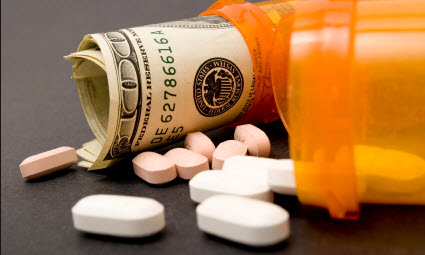
24:07 MICHELLE: Yes, okay. So what you wanna do is taper off your opiate medication, that is try to take over a week, step down to a quarter of your dose, a quarter less of your dose each week. And try to get it down if you can to the lowest amount that you can tolerate. And then I would say start introducing cannabis. Whether if you're taking opiates because of pain, you obviously, it's really hard to just try to get off your opiates and then not replace it with any kind of pain relief. You'll be miserable as hell. So if you are on opiates for real pain, I would suggest try and smoking cannabis when you're in pain. And your body will naturally sort of actually wanna limit its cannabis, not its cannabis, its opiate dependence. So what's funny is that the literature actually shows that the more people use cannabis, the less opiate pills they're taking, even when they're not trying to reduce their opiate intake. If they have a regular prescription, they start smoking cannabis, they'll start using less pills per day. So it's a natural process. Your body really doesn't like the pharmaceuticals and the opiates. It really, if you can get your pain relieved through cannabis, it'll just say, "Okay, I don't need that morphine, I don't need that Fentanyl." Which is really great for something that's trying to quit.
25:28 MICHELLE: So tapering and using cannabis while smoking it will be a great way to help be able to wean you off it and start tapering. But when you actually get to completely trying to get off opiates, you may go through an opiate withdrawal process. And so, this is where eating cannabis, or taking cannabis oil can be really, really fantastic. There's a lot of nasty side affects to opiate withdrawal, you'll end up in bathroom for quite a couple days. And what most people don't know is that cannabis was actually used to treat diarrhea back in the day. So pharmacies back, I don't know what years these were, but before it was made illegal people would actually make preparations that cannabis would be in there, and that would help treat people's diarrhea. So actually it's perfect for opiate withdrawal to start consuming cannabis because it'll help combat the nausea, the vomiting, the diarrhea, all those nasty things. It'll also stop muscle spasms. And if you know anything about opiate withdrawal, there's a lot of jerkiness and involuntary movements. Like depending on how large your dosage is, it's really something you don't expect. I was just like, "Oh my God, this is from a bad movie or something." I'm like, "This really happened?" Your body just goes haywire. And cannabis really will help you get through it.
26:51 MICHELLE: If the symptoms are really bad for you. Like, you can't deal with the nausea, you can't deal with the vomiting, you can't deal with this and that, and also insomnia's also a huge part of opiate withdrawal. So I wouldn't be above telling people to put themselves to sleep with sort of high-dose edibles or oil. Like take a 50 mg edible and see if that knocks you out. If it doesn't, try more.
[chuckle]
27:16 MICHELLE: It's really one of those things like if you are hardcore heroine addict or hardcore pill addict and you really wanna get off of opiates, what's the worst. You can't overdose from cannabis. So literally, if 50 mg doesn't put you to sleep and all you wanna do is sleep, you haven't slept in 10 days 'cause you've gone through a horrible withdrawal. Oh, I don't care how much cannabis it takes you to get to sleep, you need to sleep so your body can repair itself. So if the 50 doesn't work, 100 doesn't work, 200, might be the magical wand. But cannabis can definitely help people get to sleep, can help stop the vomiting and nausea that really, if you don't have any food going in your body, you can also realize how hard that is for your body to heal itself. You need to sleep, you need to eat, you need to not lose fluids. So cannabis can help with all these things and without putting you on another toxic, harmful, addictive drug. Another amazing thing that cannabis does, that these other drugs that they treat opiate addiction with can't do, or can do, sorry. Cannabis can actually repair your liver, which is really amazing 'cause most people have screwed up their liver being on pills or heroine for a long time.
28:31 MICHELLE: So cannabis can actually bring you to another level of health by repairing your liver so that you can actually metabolize other drugs that you might need, pharmaceuticals or things like that in a normal way. For me, it took a while, even after I was off of the opiates, it took a while for my liver to start acting normally. And it's just funny, now I can metabolize alcohol normally, like all these things. You don't even realize how sick you are and how sick your liver is until you start taking cannabis and you're like, "Wow, this is what it's like to be a healthy normal person." I'm about a year off of opiates completely and I've never been healthier. I mean the two years I was on them was just miserable. So I'm thankful for every day and it's just funny, my doctor, actually I had to switch my doctor. Because he says because I won't take opiates... I was in a car accident and I hurt my back and I was like, "No, I don't want opiates." And he was like, "What are you using for pain?" And I'm like, "Cannabis." And he wrote "Substance abuser" on my file. I'm going...
29:33 CURT: Wow.
29:35 MICHELLE: "Oh my goodness. There's still so much training to do even here in Colorado." But don't care what your doctor says. Don't care what anyone else says, what your family members say, it's your body. And you have the right to make the decision over what's healthier for you knowing can even save your life.
29:52 CURT: Wow, that's an amazing story right there. You touched on it a minute or two back. I'm gonna ask you a question as a complete neophyte and not scientist. Tell me if my train of thought is right or wrong just in an educational sense. Opiates, obviously, give you a high. So if I'm listening to this in Italy or New Zealand or I have a loved one in Nigeria and I gotta give them cannabis that I can get, would it make sense, again from the non-scientific neophyte person asking the question, to start with a high THC, cannabis strain because that is the high part of cannabis? So as a getaway drug to go from a high of an opiate to a high of a cannabis strain, and then work my way to a lower THC. Does that make any sense? Or is that the theme of what you would agree at an educational only that kind of make sense?
30:54 MICHELLE: From a traditional addiction standpoint, you don't really wanna... Again, say, "I'm going to replace the high from one drug with another high." What you're trying to do with cannabis is not to get high, what you're trying to do is rebound to your opiate system so they will no longer needs the opiates. Because I think that's the really the last thing we wanna see. Okay, we'll move your act of heroin but now you're a hard core cannabis addict. What we actually see is that heroin or opiate addicts, will use cannabis and actually reduce their opiate consumption, many people to the point where they don't use it at all, and they don't become subsequent cannabis addicts. I would say the best thing you can do if you have an addiction problem and you wanna use cannabis, use it to get off your opiates but don't... Still you need to see what the root of your addiction problem was.
31:52 MICHELLE: A lot of people have other emotional issues or other co-morbid conditions like depression and anxiety. And even if you get off your opiates, and you don't treat those kind of underlying problems, you might end up having a condition like Cannabis Use Disorder, cannabis addiction. Just because you're using a substance as a crutch to deal or get away from your emotional problems. So, yes, well I have to say that if you're going to be a person that's going to be addicted to drugs no matter what it is that your personality. You don't wanna deal with some of the emotional issues that have happened to you, though. I would say it's a 100% safer to be addicted to cannabis and be using a lot of it everyday than heroin because you can clearly die from heroin or alcohol or pill abuse.
32:46 MICHELLE: It's definitely not the ideal situation. So I feel like if you have used cannabis or planning on using cannabis to get off of opiates and then you start still seeing a problem with using cannabis everyday and then you still can't interact with your loved ones or get a job or things like that, definitely still seek some kind of treatment for the underlying problems you're having. It's definitely never good to say, "Here you go. Swap this for that." What we wanna do is make sure that the person is healthy. But definitely, if we had to choose a lesser evil, swapping out opiate addiction for cannabis addiction, that will be the safer thing. It'll help save their life.
33:30 CURT: And if someone around the world is listening to this in a week, maybe it's a medical community or maybe it's someone with a loved one. They want to contact you and I will see we won't be giving out personal cell numbers, what do they do to get in touch with Dr. Michele Ross?
33:44 MICHELLE: Sure. So we're actually ramping up our staff at our non-profit so we can start handling some of these inquiries and referring people to the right doctors or experts in their states. But my personal e-mail is actually michele@theimpactnetwork.org. So I know that's a mouthful. So, theimpactnetwork.org.
34:11 CURT: And the Impact Network, what do they have coming up in the next few months? What's the plan and where are the events? Where could someone meet you if they're in the US?
34:18 MICHELLE: Yeah. So we're located in Denver, Colorado although I do bounce around the country every once in a while giving talks. So our next event actually is July 9th in Denver, Colorado. It's gonna be a conference on cannabis and cancer. So we're gonna be talking all about how... The controversy of whether cannabis oil can actually treat cancer or it just treats the side effects of chemo and have a patient panel with real survivors and patients that are fighting themselves right now and they have taken different options. From whether, "I'm just gonna take it to help with my chemo," or "I use this to completely kill my brain tumors." It's gonna be a fantastic conference and we hold conferences once a month. Our next one after that is actually gonna be a sort of a funny one. You have to hold something light after cancer.
35:04 CURT: Yeah. [chuckle]
35:05 MICHELLE: So our next one is gonna be our Pets and Cannabis one in August. And we're gonna actually have the patient panel where our dogs bringing their owners and talk about how cannabis helped them. [chuckle] Woof-woof.
35:18 CURT: So from the Impact Network in Colorado, they can get in touch with you through your e-mail. And it's fascinating because a lot of the internet interest on our social network is around cannabis. I'm sorry, about cancer. And we probably have at least three or four post up about it written by different people, as well as, yourself. So I appreciate your time on this 4th of July weekend. I will let you get to your festivities and key lime pie, the edibles, in both sections, the real one and the other one. And I appreciate it. Thank you for taking a little time to talk to cannabis.net.
35:51 MICHELLE: Thank you Curt.
35:53 CURT: Alright. We'll talk to you later.
If you are on the Slideshare app or your desktop, you can also listen to this interview on Slideshare. Just cilck the
Slideshare video below.
OTHER ARTICLES THAT MAY INTEREST YOU...
SHOULD YOU MIX CANNABIS AND OPIOIDS, CLICK HERE.
OR..
IS TAKING CANNABIS OUR CURE FOR PAINKILLERS, CLICK HERE TO READ.
OR....
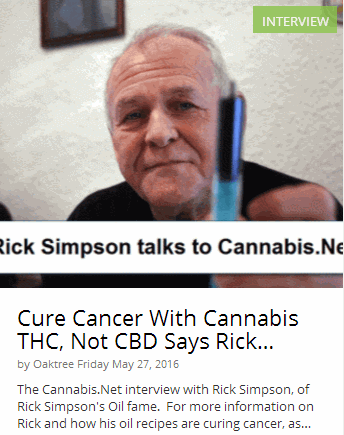
CURE CANCER WITH HIGH THC, NOT CBD, SAYS RICK SIMPSON, CLICK HERE TO LISTEN AND READ...

